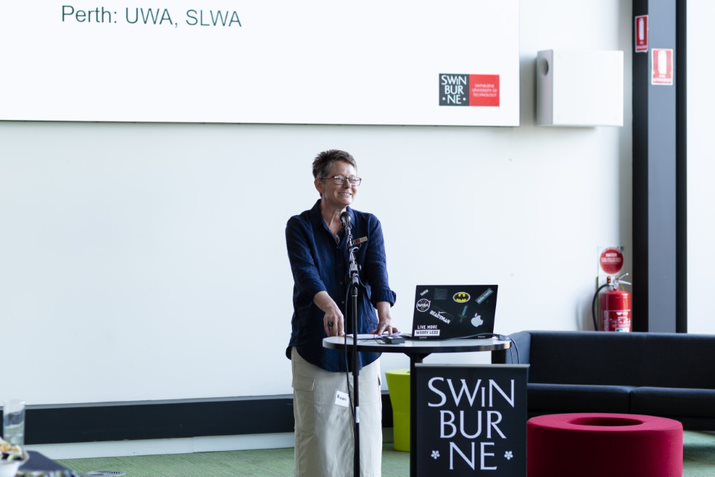Swinburne professor saving decades of digital artefacts

Professor Melanie Swalwell speaks at the launch event of her new project, The Australian Emulation Network.
In summary
Professor Melanie Swalwell has launched The Australia Emulation Network, an ARC Linkage Infrastructure, Equipment and Facilities project, that brings digital artefacts back to life for emulation and use
If action isn’t taken now, decades of important historical content could be lost
Professor Swalwell hopes that EaaSI could be the pathway to a Centre of Excellence for digital cultural heritage
Expert in digital media heritage at Swinburne’s Centre for Transformative Media Technologies, Professor Melanie Swalwell has launched The Australia Emulation Network, an ARC Linkage Infrastructure, Equipment and Facilities (LIEF) project, that brings digital artefacts back to life for emulation and use.
The Emulation as a Service Infrastructure platform (EaaSI) provides access to previously inaccessible artefacts that require obsolete computer hardware and software environments. Building on two of Professor Swalwell’s existing Linkage projects, Play It Again and Archiving Australian Media Arts, this project addresses the challenge of aging software with an industry-based focus.

This project builds upon Side-by-Side which emulates videogames and media artworks installed on original platforms and a browser-based emulation platform EasSI.
Time for action
Professor Swalwell says this project scales up her previous projects to prevent the loss of even more important digital material.
“This is an area of great need. We've not done much about this in Australia for quite a long time, so this project is going to really kickstart things and build a national software archive that will benefit all partners,” Professor Swalwell says.
If we don’t take action to archive these artefacts now, Professor Swalwell says, we could lose decades of historical material.
“There is a digital dark ages scenario looming. If we don't have access to records from when we started using computers in a significant way in the 80s and 90s, whole decades of content will be lost,” Professor Swalwell says.
Speaking at the project’s launch event, Dean of the School of Social Sciences, Media, Film and Education Professor James Verdon said the project is one that’s close to his heart.
“This project is about accessibility and thinking about the ways we can engage tangible solutions that enable legacy digital artefacts to become content that can be played and interacted with using minimal IT resources,” he says.

This project shifts the focus of emulating industry-based artefacts.
Professor Swalwell says creating EaaSI as shared infrastructure lowers the bar for its users and will give them confidence to collect digital media now and in the future.
“This shared infrastructure will mean organisations won't need to have incredible IT gurus in house who can build them bespoke solutions. It'll be a platform that organisations can access through a web browser.”
The first steps towards a Centre of Excellence
Professor Swalwell hopes that EaaSI could be the pathway to a Centre of Excellence for digital cultural heritage.
“This infrastructure project is a key step and recognises that there is important research to be done across a number of disciplinary domains, which require access to currently inaccessible, legacy digital artefacts,” Professor Swalwell says.
This project is in collaboration with Swinburne University of Technology (lead), RMIT, University of Melbourne, UniSA, Western Sydney University, University of Western Australia, UNSW, AARNet, ACMI, AIATSIS, Art Gallery of NSW, Museum of Applied Arts and Science, Australian Computer Museum Society, National Archives of Australia, National and State Libraries of Australasia (NSLA), Open SLX, Yale University, Cornell University, Australian Institute of Architects, National Library of New Zealand, and Archives New Zealand.
-
Media Enquiries
Related articles
-

- Technology
- Science
- Engineering
Victorian students drive green energy transition through international hydrogen competition
Swinburne’s KIOSC, in collaboration with Horizon Educational and Gippsland Tech School, co-hosted the Hydrogen Grand Prix in Melbourne.Friday 26 July 2024 -

- Technology
- Health
New MedTechVic prototypes to transform everyday lives of people with a disability
Swinburne’s MedTechVic has revealed three new prototypes designed through the joint Health-led Manufacturing Innovation Program, in partnership with the Australian Medtech Manufacturing Centre and Safer Care Victoria
Friday 19 July 2024 -

- Business
- Technology
Swinburne’s Luminate Pitch Night 2024 advances innovative ideas for a better world
Swinburne’s 2024 Luminate Pitch Night showcased market-ready ideas from 10 founders
Wednesday 12 June 2024 -

- Health
- Technology
Clinical Innovation Fellowships develop creative solutions to Australia’s healthcare challenges
MedTechVic is gearing up to begin its fourth year of the Clinical Innovation Fellowship Program (CIFP), following the highly successful third round in 2023.
Wednesday 19 June 2024 -

- Technology
- Aviation
- Sustainability
Swinburne partners with Latrobe City Council to propel Victoria’s Advanced Air Mobility precinct
Swinburne has become the first Foundation Member of the newly established Latrobe Aerospace Technology Precinct.
Friday 03 May 2024

